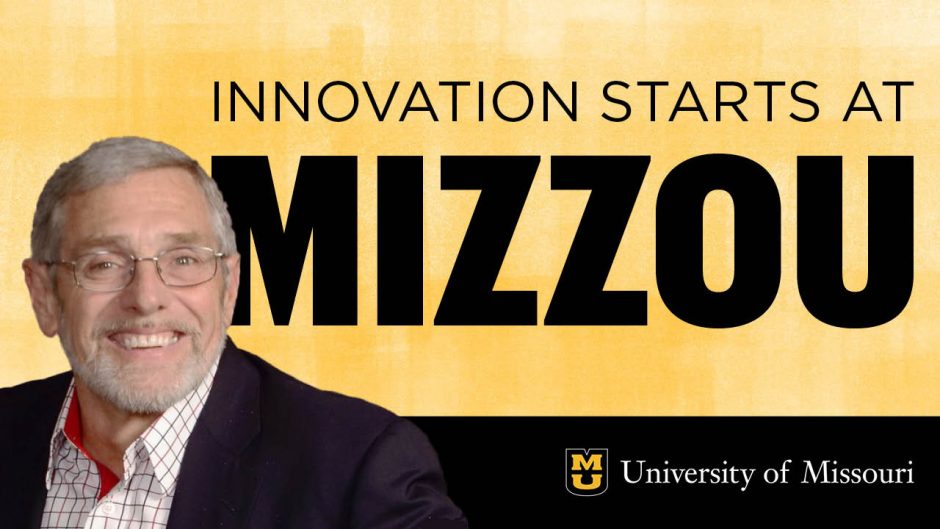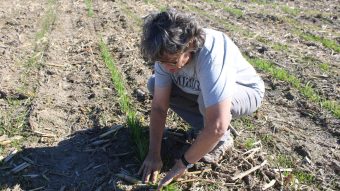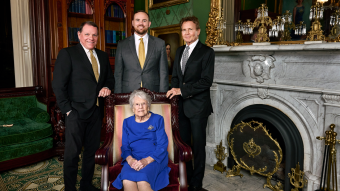
Oct. 30, 2025
Contact: Sara Diedrich, diedrichs@missouri.edu
Joe Roetheli, BS ’70, PhD ’79,became an entrepreneur the way many do — by solving an everyday problem. When his beloved dog, Ivan, developed terrible breath, Roetheli created a solution that became a sensation: GREENIES®.
It was the first of many companies and products Roetheli and his wife, Judy, launched over the past 30 years. In less than a decade, GREENIES® — produced by their company S&M NuTec — skyrocketed in popularity, making it the eighth largest pet food company in the world. Soon, other successful pet product ventures followed. Their success eventually led to the creation of a private foundation.
The secret? Roetheli’s three Ps — persistence, passion and performance — and a University of Missouri education from the College of Agriculture, Food and Natural Resources.
“We are more path-makers than path-takers,” Roetheli — who lives in Kansas City, Missouri and is known by some as “MoJoe” or Missouri Joe — said. “Path-makers are innovators — always seeking new and better ways to do things. That mindset has guided our focus and success in both pet products and power tool accessories. It’s how we’ve been able to truly differentiate what we offer, rather than just provide another version of an existing commodity.”
An agricultural economist by training, Roetheli credits his mentors in Mizzou’s Department of Agricultural and Applied Economics for instilling in him the concepts of comparative advantage and product differentiation.
“That has been my life’s work,” he said. “It’s how I sell products and ideas to people.”
The knowledge he gained on campus and skills he first honed as a Tiger laid the foundation for a successful career.
From the farm to Mizzou
Before enrolling at Mizzou in the late 1960s, Roetheli first learned lessons in innovation on the family farm in rural Hermann, Missouri. His parents didn’t have the opportunity to attend high school or college, but they understood the importance of education and hard work.
“I learned a lot from growing up poor — how to save, how to be thrifty and how to be resourceful,” Roetheli said. “My parents valued education deeply, even though they never had the chance to pursue it themselves. They were devoted to family, and together those values shaped my character.”
By his own admission, Roetheli was a decent student in high school, though not as outstanding as his older sister, who was valedictorian. He turned his academics around at Mizzou after receiving a D on his first college exam. That’s when he made a bold decision.
“I vowed to read every assigned textbook at least three times,” he said. “The first reading prepared me for the lectures, the second helped me connect the material to what was discussed in class and the third showed me how to apply it to real life. That approach has been the single most valuable lesson of my entire life.”
After graduating from Mizzou in 1970, Roetheli served as a finance clerk in the U.S. Army during the Vietnam War. He went on to earn a master’s degree in food and resource economics at the University of Florida, where he met his wife. For the next 14 years, he worked in agricultural economics at the University of Idaho and the Tennessee Valley Authority (TVA), earning his PhD from Mizzou along the way. In 1988, he once again returned to Mizzou on assignment with the U.S. Department of Agriculture (USDA), which eventually hired him to lead the oilseeds program. Over the years, Roetheli served as the “hub” in creating a renewable energy program at TVA and an industrial uses of agricultural commodities program at USDA. He became widely recognized as an expert on new crops and industrial uses of agricultural materials.
An accidental entrepreneur
When he stepped away from his government career in 1996, entrepreneurship wasn’t on his radar. But Ivan’s bad breath — and Roetheli’s drive to solve even the most ordinary problems — changed everything.
“We had two Samoyed dogs, and both of them had terrible breath, but Ivan’s was the worst,” he said. “Judy was determined to fix it. She tried everything she could find at veterinary clinics and pet stores, but nothing worked. One day she looked at me and said, ‘Joe, you need to fix the dogs’ breath.’ I had no earthly idea where to start, but eventually, I decided to give it a try.”
Always the academic, Roetheli turned to an expert for advice: his dentist.
“He pulled every article and resource he could find, then handed me a stack of journal papers,” he said. “I sat down with a highlighter, studied them and eventually came up with a recipe.”
Roetheli developed a mixture of wheat, chlorophyll, vegetable oil and other edible foods that he served dry to Ivan. Within 10 to 14 days, Ivan’s teeth were clean, and his bad breath was already about 75% improved. Roetheli later molded the mixture into a bone with a toothbrush at one end — the familiar GREENIES® Treats shape customers know and love today around the world.
“Honestly, I was just trying to solve a problem for my wife more than for the dogs,” Roetheli said. “But it worked. That little family project became the foundation for GREENIES® dog treats.”
Once the entrepreneurial bug bit, Roetheli was hooked. Over the next six years, sales grew by an average of 70% each quarter. New pet products followed, including Pill Pocket®, Yummy Combs® and Longevity15™. The couple also expanded into power tool accessories with Spyder®, and their products ultimately reached more than 60 countries across six continents. According to Gallup Business, the combination of Roetheli’s five top business talents represents a one-in-33-million occurrence.
“They all required a lot of innovative thinking,” Roetheli said. “I’ve done so many things that people told me couldn’t be done, but that’s just fuel for the fire with me. Growing up on a farm, where being resourceful was essential to survive, taught me how to push through challenges and find solutions. And I always go back to my college days — the lessons I learned and how to apply my knowledge.”
The meaning of success
In 2006, the Roethelis sold their pet food and treat company to Mars, Inc.
While Roetheli enjoyed his success and newfound wealth, he felt a strong responsibility to give back. He and his wife established The Roetheli Lil’ Red Foundation, which funded the construction of five villages in Guyana complete with homes, sanitary facilities, schools, retail stores and community centers. The foundation has also supported the building of homes in Guatemala, Nicaragua, Colombia, and Haiti and funded a deep well in Malawi, providing safe drinking water to 20 villages.
He considers the foundation’s work his greatest achievement.
“To see people who have never lived in a real house finally have a home is profoundly moving,” Roetheli said. “When someone has spent their life with nothing more than a piece of cardboard propped against a tree for shelter, even a modest house feels like a castle. Their gratitude is overwhelming. It’s truly awe-inspiring.”
For Roetheli, success isn’t measured by his bank account but by the impact of his actions.
"If something I’ve done helps someone else, that’s a big deal for me.”
Advice for up-and-coming entrepreneurs
Joe Roetheli believes every entrepreneur should conceive of an epitaph that will guide their life.
“Your epitaph becomes a clear vision of what you want to accomplish and what drives you every day,” he said. “Once you define it, you can chart a path to reach it by setting intentional steps. You know what you want — now it’s about going out and making it happen.”
He encourages entrepreneurs to let that vision serve as a compass for every choice.
“Every decision you face should be measured against that vision: Will this move me closer to where I want to go? Whether it’s falling in love, choosing a job or making any major life choice, ask yourself if it aligns with your ultimate destination,” he said. “You’re constantly thinking about how to get there — smarter, faster and better.”



